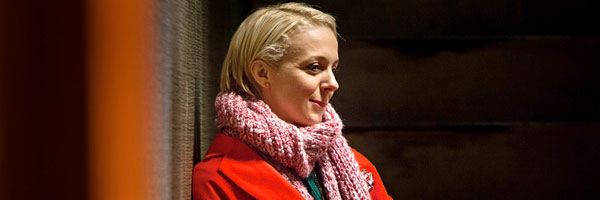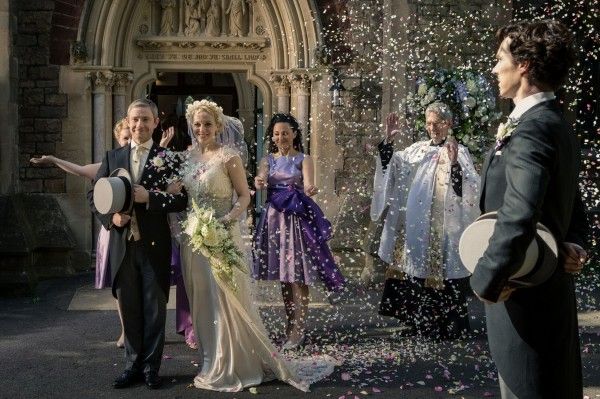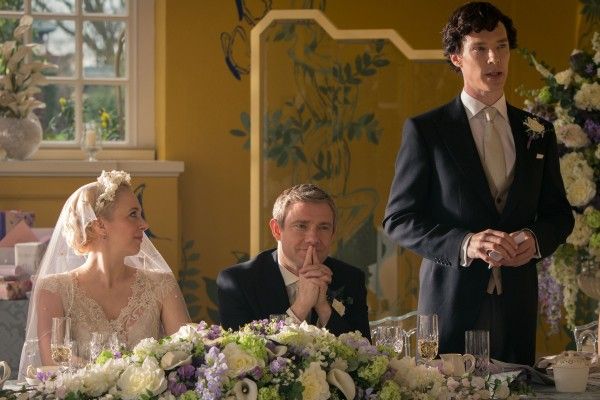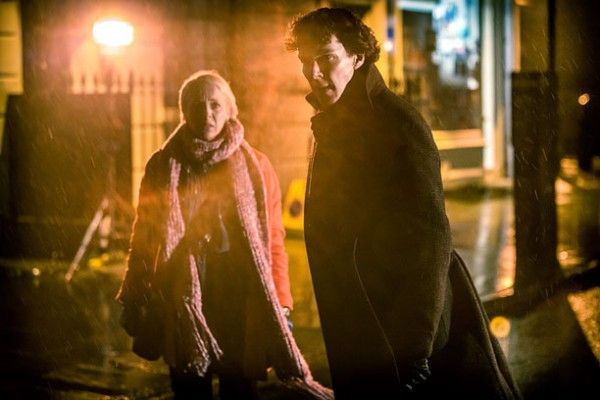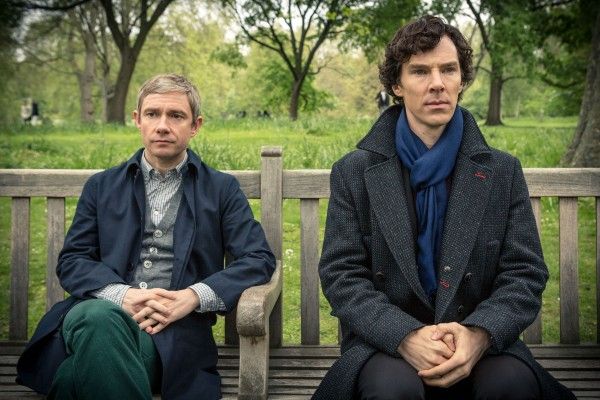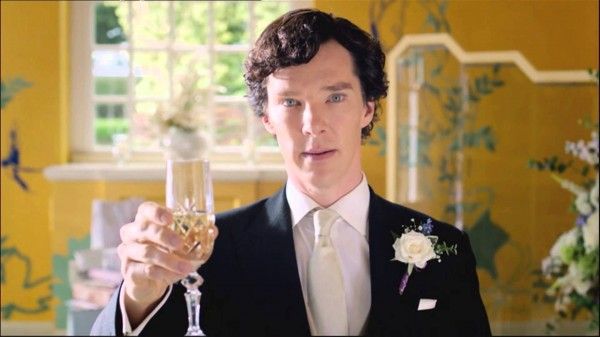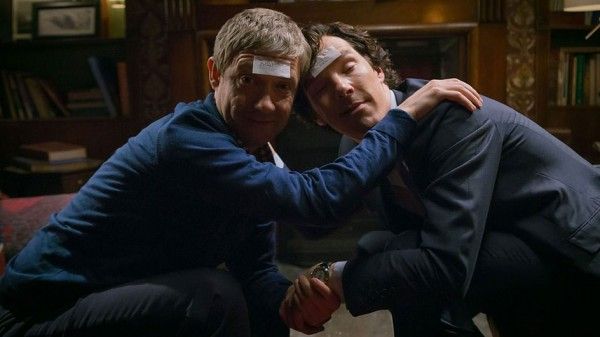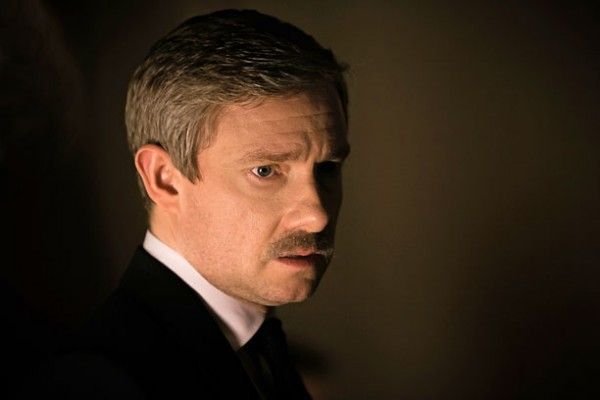With Sherlock (which airs on Masterpiece on PBS), the contemporary reinvention of the Arthur Conan Doyle classics, written and created by Steven Moffat and Mark Gatiss, Sherlock Holmes (Benedict Cumberbatch) and Dr. John Watson (Martin Freeman) face enemies, solve crimes and try to figure out how to navigate their own friendship. After Sherlock barely survived Moriarty (Andrew Scott) in Season 2, Watson had to survive not only marriage to Mary (Amanda Abbington), but what her secrets would mean for their future. And even though fans might have to wait another couple of years to see where things are going next, I know that I sure can’t wait to learn what twists and turns will be in store.
During this recent exclusive interview with Collider, actress Amanda Abbington talked about how she found out that they wanted her for the role of Mary, finding the duality of this character, why she loved doing this role with her real-life partner Martin Freeman, how challenging it was to get sewn into the wedding dress, Mary’s true feelings for John, and what type of parents John and Mary might make. She also talked about her work on Mr. Selfridge, as Miss Mardle, what she looks for in a project, and how she’d like to do American television. Check out what she had to say after the jump, and be aware that there are some spoilers.
Collider: Did you have any idea that they were thinking of you to play Mary, or did it take you by complete surprised when they approached you about the role?
AMANDA ABBINGTON: Mark [Gatiss] had said to me, “We will get you in Sherlock, eventually.” I’d known Mark from a job I did before, so I thought he was just being his usual jovial self and just mucking me about. But, after “The Hounds of Baskerville” aired on British television, we were all around Mark’s house. There was me, Mark, Martin [Freeman], Steven [Moffat] and Sue [Vertue]. After it finished, they said, “Do you want to come into the kitchen and we’ll talk about the third [season]?” I said, “Well, I’ll come in and have a listen.” So, we sat down and they were talking about the story arc, and they said, “We’re going to introduce Watson’s wife. We’re going to introduce Mary Morstan.” And I thought they were going to say to me, “Do you have any ideas for what good actresses could play that part?” I was all ready to say this list of my favorite British actresses. And then, they said, “And we’d like you to play it.” I got very emotional and just looked at Martin and said, “Would you be happy with that?,” and he said, “I really want you to play it.”
Would you have never suggested yourself?
ABBINGTON: No, I don’t think so. I’m too modest. I will talk myself out of a job. I probably would have joked and said, “Or, you could pick me.” But, I was so flabbergasted and just so happy. It’s such an amazing program. I do think it’s one of our finest. And to be part of it, and to play Martin’s wife, is just exciting.
Was there no way you would have said no? Did you hesitate, at all?
ABBINGTON: No, I just jumped at it and said, “Yes, I’ll do it!” I didn’t really think of the connotations. I wasn’t familiar with Conan Doyle, at that point. I knew of him, and I dipped in and out, but I didn’t realize that Mary Morstan was such a divisive character. She is, to diehard Sherlock fans. People were worried that she would come in and split the two apart. There was a lot of that on the internet, when they found out that I was playing her. They were like, “I can’t believe she’s going to be in it. I hate her already! I’m going to turn it off, after the first episode.” And then, within 50 minutes of it being on screen in Britain, there was a turn-around, which was just such a relief, really. They were saying, “Oh, we love Mary! She’s just slotted right in, and she’s not going to split them up. She’s being really cool.” So, I was very pleased.
How did you approach finding this performance? Was it all in the scripts?
ABBINGTON: Yes, it was. We started in April and we finished in June, for the first two episodes. And then, there was a hiatus when the boys went off to do other things, so we had to wait a long time for the third episode. And I had no idea what her story was going to be, in the third episode. Mark had said, “She’s not what she seems,” but they weren’t telling me what she was. I didn’t realize that she was going to shoot Sherlock. I had no idea! I was like, “Oh, god!” Martin and I got the third episode, and we read it in the sitting room together. When we got to that page, I was like, “They’re gonna kill me! They’re gonna hate me! Everybody is gonna hate me! I kill the hero in 40 minutes.” And then, once we got to the end of it, we were like, “Oh, no, she’s fine. She didn’t mean it. She just did it because she was really scared. It’s fine.” It was good because people were like, “Oh, poor Mary!” They had forgotten that she just shot Sherlock. So, it was quite nice that I didn’t know what was going to happen. It was nice to be in the dark about that and just play her as somebody with a secret. We didn’t know what it was, but she was still very strong-willed and a happy character. I think Mary is quite cool.
When you got to the part of the script that started listing off all of the things that Sherlock should have noticed about Mary, did you find yourself going back over it?
ABBINGTON: Yeah! I was like, “Thank god, I did it like that,” because it was ambiguous. When he analyzes her in the first episode, it says, “liar” and “secret,” and I didn’t know that. I only knew that when I read it on Twitter. I was like, “Oh, my god, it says liar! It says secret. That’s brilliant!” I had no idea. It was great. Steven made a good point about it. Sherlock knows that she has a secret and that she’s a liar, but he doesn’t want to see it because he doesn’t want to see the truth. I thought that was quite an interesting thing, that Sherlock doesn’t want to see that.
Did it feel like it really worked to your advantage, in playing the relationship between John and Mary, that you have a real-life relationship with Martin Freeman, especially since the viewers didn’t get to see that courtship?
ABBINGTON: Yeah. You get that history. We’ve always said that we wanted to do more stuff together. Because we’ve lived together for so long, I do think we have a natural shorthand with each other. I think that’s probably why Steven and Mark got me in, as well. They knew there would be this natural chemistry between the two of us, that would need to be reflected in the two years they’ve been together.
What was the first day on set like? Did it already feel like you were part of the family, even though you were technically the newcomer to the cast?
ABBINGTON: Yeah, straight away, I felt very welcomed. I used to go down to the set with the kids, and we’d visit and go have lunch, so we were familiar faces there. But to be a part of it, it was just a nice relief. You have that job security, and you’re in something that’s really critically acclaimed. There is that feeling of, “Wow, I’m in Sherlock. That’s amazing!” And everyone was really nice and accepted me. It was really cool. And of course, Martin is very loyal. He wouldn’t let anyone be mean. And Benedict [Cumberbatch] is just a sweetheart, anyway. I’d worked with Sue and Steven before, and I’d worked with Mark Gatiss before, so it was just lovely. And everybody else was great, too. They were all very welcoming.
What was it like to shoot that scene in the restaurant, where Sherlock and John are reunited, after John thought Sherlock was dead for two years?
ABBINGTON: It was one of the first scenes we shot, in the first week. It was slightly surreal because it did feel like he’d been away, and he hadn’t seen him. It was so charged, that scene. When John sees Sherlock for the first time, and then looks at Mary, it’s that look of, “I don’t know what I’m going to do now.” Both Martin and Ben pitched it so beautifully, especially Martin. In that one look, you see those two years of hurt. It was heartbreaking. But, it was definitely a charged room. It was incredible.
How was it to get into the wedding dress?
ABBINGTON: It took so long to get into it ‘cause I had to be sewn into it. It was beautiful, but it took about 45 minutes to get into it. You had to be careful because it was antique lace. It had a long train that had to be sewn up. So, I’d stand there for about 45 minutes, being sewn into it, every day for about two weeks. That doesn’t seem long, except that in the summer, you just want to be outside having a cup of tea.
Did marrying Martin Freeman on screen feel surreal, at all?
ABBINGTON: No, it didn’t. Not really. What it felt like was just a party. It felt like a really lovely, long party. The weather was beautiful, and there was a fantastic core of supporting actors who came in. We had this group of wonderful actors, and we just sat out on the grass, in between takes, in the sunshine. It did feel like a holiday. It was lovely. I think it was one of the highlights of my filming of Sherlock. We were all staying in a hotel, and we would go out for tapas in the evening. It was great.
Did you ever secretly wish that you’d gotten to do the actual ceremony, and not just the wedding reception?
ABBINGTON: Martin and I said, “We should have done this, shouldn’t we? We should have actually gotten married secretly, and then just been married.” But, we didn’t follow it through. I think, one day, we will get married, but it will probably be in Italy, somewhere on our own with our kids. All that party stuff, we’ve done it on screen.
There’s such an interesting duality with Mary being this strong, independent woman who is also very vulnerable. Were you always conscious of that, or did you just focus on who she was, in any given moment?
ABBINGTON: It was moment to moment. Because of who she is, I wanted there to be three stages. I wanted there to be this very sweet, quite confident in her own skin woman, and then I wanted there to be this cold assassin who would shoot someone to save her skin. And then, the reason why she breaks is because her love for John is so strong. If she loses him, then she loses everything. In my head, I had a story arc of how I wanted it to go. I had points. I wanted her to be this mysterious, funny girl, and then this really cold assassin. I’m hoping it came across. I don’t know if it did. Underneath it all, she’s just this girl who wants to be loved. She’s had this pretty terrible life and she wants to forget about it, and she needs the love of John to help her.
Do you think she’s manipulating John Watson, at all, or are you feelings for him truly genuine?
ABBINGTON: No, I don’t think so. I think she wanted to completely forget about her past. The fact that it’s dredged up causes her to do something that she regrets doing and doesn’t really want to do. It’s a knee-jerk reaction. She just goes back to her old ways to save herself. It’s quite a complex character, and I hope that I hit all the beats.
When you look back on the experience of doing this show, what was the most fun thing about embodying this character?
ABBINGTON: I think just the way she changes from being the Mary we see in the first episode to the third episode. That transition was just so much fun. And just being the assassin in the third episode and shooting Sherlock was a lot of fun. It was just brilliant. Walking onto set with James Bond’s gun and just shooting him was so much fun. It was James Bond’s gun, apparently.
With John Watson ultimately accepting Mary’s past and living in blissful ignorance, and then hearing that Steven Moffat and Mark Gatiss already have ideas for Seasons 4 and 5, are you excited to find out where things might go for your character?
ABBINGTON: Yeah, definitely. Mary does die in the canon, so I don’t know. It’s hard to tell, with Mark and Steven. They’ll flip things over. With the end of Episode 3, bringing Moriarty back is brave and bold. How is that even possible? But, they will find a way of making it so. So, I’m sure she’ll probably take a backseat, slightly, ‘cause it’s all about John and Sherlock, but I’m hoping she’ll have some meaty stuff to do.
Have you thought about what kind of a mother Mary will be, or what kind of parents they’ll be together?
ABBINGTON: Yeah, Martin and I were talking about that. I think they’ll be brilliant parents. I think they’ll be really good, but there will always be a side of her that’s an assassin. Whether she tells her children or not, I don’t know. But ultimately, I think they’ll be really good parents, if a little psychopathic. All three of them are psychopaths, really. They’re all after trouble and danger. That’s what I love about it. Sherlock just comes back after two years and expects everything to be all right. And then, John has killed a serial killer and goes off to danger where he can. And Mary is this assassin. They are these three insane characters who bounce off each other, and I quite like that. I like the idea of them all being slightly demented and dangerous. They rely on each other. John and Sherlock need each other to carry on with their lives. They’re very important to each other.
What’s it like to also have Mr. Selfridge to go off and do?
ABBINGTON: It’s a little respite. They’re each a respite from each other. Just as you’re getting not bored of playing one character, but you’re getting into the rhythm of it, then you’re called away to do a completely different character. It keeps you on your toes. It’s fun. I love it. And I realize that I’m very lucky. It doesn’t happen all the time. They’re both so diverse. They couldn’t be more different. It’s every actor’s dream to do something so completely different. Just the tone of them both are very different. There’s a huge cast with Mr. Selfridge, and a relatively small cast with Sherlock. I love it.
At this point in your career, what do you look for in a project and role?
ABBINGTON: It’s always good writing. If you get a script and it’s really well written, that’s always exciting. That will always grab your attention. If the character is really well-rounded and it’s a really strong character, and if the writing is just fantastic, that’s the thing that will hook me in, certainly.
With Martin Freeman doing Fargo now, have you considered doing American television, yourself?
ABBINGTON: Yeah, I would love to. I would love to work here. Hopefully, maybe things will start to happen. That would be nice.

